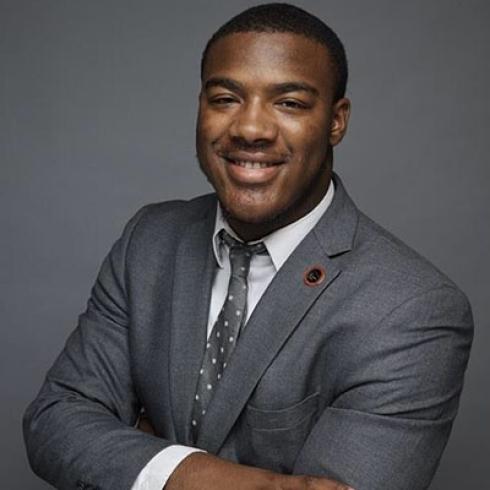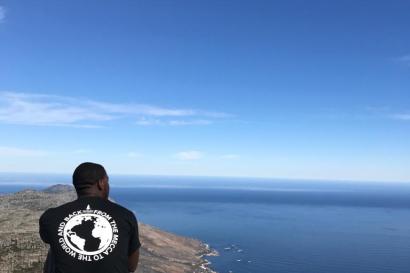As an African-American man born in the United States, there are many challenges I face simply due to the color of my skin. I have always thought about what the black experience looks like in other countries across the globe. Last week, I had the honor of visiting the Langa community. This week, I had the honor of having an in-depth conversation with a black UCT student from the Free State, one of the nine provinces in South Africa. Both experiences were captivating! I learned about many similarities between black citizens in South Africa and black citizens in America.
First, my visit to the Langa community was completely transformative. The Langa community is one of the oldest townships in South Africa. The housing in this township mirrored the exact housing structure that black Americans living in poverty in the U.S. reside in. Specifically, it mirrored the Langfields Projects, which are low-income housing apartments located in Buffalo’s inner-city. This experience was eye-opening. It was overwhelming to observe how poverty has similar effects and visual similarities across the globe. My visit to the Langa community also reminded me of my commitment to uplift black communities who may lack resources in the United States to progress forward, and eventually expand my outreach to the global community. Poverty is not talked about enough, and no human being deserves to live in such conditions. We have too many intelligent people and resources in the world to allow a reality such as poverty to affect so many lives. We should all lift as we climb and bring others with us to success! Community outreach, and my commitment to addressing social issues runs deep through my soul, and my visit to the Langa community truly re-iterated the legacy I envision to leave behind as I continue to make significant impacts in society.
My conversation with the UCT student I mentioned above was captivating as well. I attended a public high school in the states. Public schools lack an abundance of resources and funding that private schools receive. This prevents black students who attend such schools from receiving a competent education. Additionally, some top schools discriminate against black students by denying them acceptance. Also, it is important to note that public schools are designed similarly to other institutional structures such as jails. Essentially, public schools serve as a form of systematic oppression, especially noting that black history starts from slavery. Imagine being a young black boy or girl learning that your “ancestors started as slaves.” This tool is used to indoctrinate inferiority into the psyche of young black children, which affects their behavioral patterns as they grow older without the proper education. I encourage you all to read Brainwashed: Challenging the Myth of Black Inferiority written by Tom Burrell. In this book, he deconstructs the masterful marketing of black inferiority that exists due to negative propaganda associated with the depiction of the black experience. Moving forward, I was not surprised the UCT student stated his school system discriminated against black students as well. He stated that the top schools in the Free State use Afrikaans as their language to teach students, which prevents black students from attending such schools because this is not the indigenous language of the people and land. Both this student and I, have worked hard to earn scholarships to attend our respective universities. Additionally, we are both first-generation college students.
Next, me and this student talked about our views on diversity and inclusion and working in corporate spaces. He informed me at the start of his last internship, he walked in with confidence but was soon reminded of his “place” and “inferiority.” I expressed my disappointment in this matter. I explained to him the illogical nature of such acts. It made me reflect on when I was told that I should not speak up as much when starting a new job. However, this decreases the amount of value an individual may add to an organization or business if he or she is shamed for sharing their supported statements. Following this point, I explained to him that I think it's problematic diversity and inclusion even exist because this illustrates there is a problem that already exists to influence such an initiative. In addition to diversity and inclusion, there should be in-house initiatives at companies and organizations to inform employees to accept other incoming employees of various ethnic and racial backgrounds.
Lastly, he talked about him questioning his identity. For example, he stated his first introduction to race was when a group of black students at his school called him white for having a love for reading. Similarly, I was called white by other black students when I was younger as well. But what does this mean? It relates back to my point mentioned earlier about how specific school systems attempt to indoctrinate black inferiority in the psyche of black students which influences them to see everything positive as white. For example, as a child one of the first things I heard in school was that white is associated with positivity and black is associated with negativity. Following that segment of the conversation, he also stated that a lot of black students he knows do not play tennis, which is a sport he plays. He mentioned again how it is not viewed as a “black” thing to do. I had a similar experience back in the states as well and encouraged him to read The New Black Aesthetic by Trey Ellis. As black people, we should not apply color to activities or hobbies we do. This prevents us from truly living! The New Black Aesthetic discusses this concept in further detail.
Ultimately, it was interesting to observe the effects that racism, poverty, and indoctrination of false ideas has on black people across the globe. It is even worth noting the similarity of apartheid in South Africa to Jim Crow in America. Systematic oppression produces similar results under different forms in different countries due to different contexts. Nonetheless, this is a problem that must be addressed, and my visit to Langa and conversation with the UCT student was truly transformative. I must continue my efforts of addressing social issues and using my gifts to implement change both in the U.S. and globally. I will not rest without lifting others as I climb!

Ameer Dunston
I am Ameer Dunston, a junior finance major & television & film minor from Buffalo, NY at Howard University. Additionally I am a 2016 Gates Millennium Scholar and I love to uplift others through any source possible.







